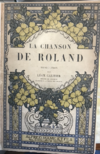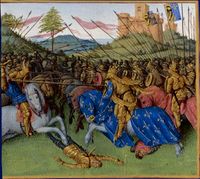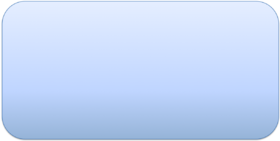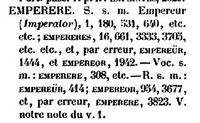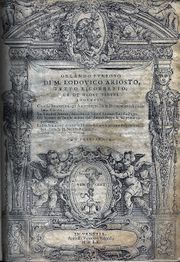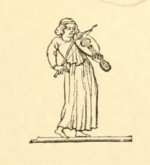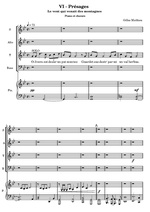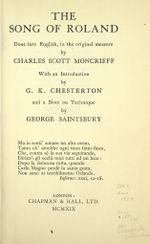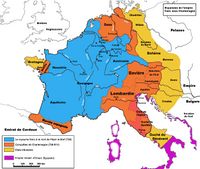A musical project on the Chanson de Roland : Différence entre versions
(→The Chanson de Roland becomes a huge hypertext) |
(→See also) |
||
| (15 révisions intermédiaires par le même utilisateur non affichées) | |||
| Ligne 4 : | Ligne 4 : | ||
This page provides information on the musical aspects of the Wicri/Chanson de Roland project. | This page provides information on the musical aspects of the Wicri/Chanson de Roland project. | ||
| − | In introduction shows a path of discovery for amateur and curious musicians. Then the Wicri/Chanson de Roland project is introduced in its scientific context (for historians and linguists). | + | In introduction shows a path of discovery for amateur and curious musicians. Then the Wicri/Chanson de Roland project is introduced in its scientific context (for historians and linguists). After, a musical suite (Oratorio profane) by Gilles Mathieu brings an original development to this digital project. Finally, a conclusion proposes to examine a European sequel. |
==Discovering Roland and the legendary world of Charlemagne while singing== | ==Discovering Roland and the legendary world of Charlemagne while singing== | ||
This wiki, called "Wicri/Chanson de Roland", is a digital library that contains musical elements. In particular, it gives access to a [[Chanson de Roland (Gilles Mathieu)|secular oratorio]] composed by a contemporary author: [[Gilles Mathieu]]. | This wiki, called "Wicri/Chanson de Roland", is a digital library that contains musical elements. In particular, it gives access to a [[Chanson de Roland (Gilles Mathieu)|secular oratorio]] composed by a contemporary author: [[Gilles Mathieu]]. | ||
| Ligne 82 : | Ligne 82 : | ||
|} | |} | ||
| − | The most famous of the manuscripts (the Oxford one) contains several hundred couplets ( | + | The most famous of the manuscripts (the Oxford one) contains several hundred couplets (laisses in French). For each laisse, a page makes it possible to compare different versions. See for example: |
| − | * the [[Chanson de Roland/Manuscrit d'Oxford/Laisse I| | + | * the [[Chanson de Roland/Manuscrit d'Oxford/Laisse I|Laisse I, which corresponds to the musical phrases seen above]] |
;Another example of reissue with Léon Gautier's glossary: | ;Another example of reissue with Léon Gautier's glossary: | ||
| + | |||
| + | [[File:Gautier 1872 glossaire emperere.jpg|right|200px]] | ||
| + | The treatment of critical editions is also very relevant in a hypertext approach. The figure on the right shows Léon Gautier's glossary entry for the term {{sc|Emperere}}. This glossary occupies approximately 200 pages (with an average of 20 to 30 entries per page). The wiki offers 3 navigation paths in this glossary: | ||
| + | * for the editors, the list of facsimiles (example [[:File:Chanson de Roland (1872) Gautier, II, page 335.jpg|the page containing {{sc|Emperere}}]]); | ||
| + | * for linguists, linear access to a republished glossary (resolution of abbreviations and links to verses). Here, for example, is [[La Chanson de Roland/Léon Gautier/Édition critique/1872/Volume 2/Glossaire/E#EM|the terms beginning with EM]]. | ||
| + | * for further processing, the glossary entry can be made into a wiki article ([[Emperere|example, looking for evidence on how to pronounce Emperere beyond the Oxford manuscript]]). | ||
| + | |||
| + | [[Fichier:Orlando furioso.jpg|right|180px|thumb|''Orlando furioso'' - 1560 edition]] | ||
| + | ;Research articles and works inspired by the Chanson de Roland: | ||
| + | In addition to reference works, it is worth mentioning here other sources of information: | ||
| + | * research articles. On Google Scholar, the query "chanson de roland" gives 30,000 results (and 200,000 for Charlemagne). | ||
| + | * the multiple articles, poems, images that were inspired by this epic. For example: | ||
| + | ** In France: [[La Légende des siècles/1/Le mariage de Roland|La mariage de Roland par Victor Hugo]] or [[Le Cor|Le Cor d'Alfred de Vigny]]). | ||
| + | ** In Italy: In 1300, Dante Alighieri quotes Roland, Charlemagne and Ganelon (In Hell from the Divine Comedy, cantos xxxi and xxxii). In 1521, the complex character of Roland inspired Ariosto with his [[Orlando Furioso]]. | ||
==Musical topics== | ==Musical topics== | ||
| + | We have shown the interest and scope of a digital project on the Chanson de Roland. | ||
| + | |||
| + | This poem naturally inspired musicians. | ||
| + | |||
| + | On this wiki, we have for example excerpts from the opera [[Roland à Roncevaux (Larousse - G.D.U. XIXe siècle)|Roland à Roncevaux d'Auguste Mermet]]. This piece sings of Roland's bravery but has little to do with Théroulde's poem. | ||
| + | |||
| + | Likewise, the poem Orlando furioso was the basis of some operas by Vivaldi, Lulli, Luigi Rossi or Georg Friedrich Handel. But their framework is very far from that of the Chanson de Geste. | ||
| + | ===Contributions of Gilles Mathieu's oratorio for the digital site=== | ||
| + | [[Fichier:Chanson de Roland Gautier Populaire 1895 page 7 fig 1.png|150px|right|thumb|a juggler]] | ||
| + | The musical works inspired by the Chanson de Roland are therefore often quite far from the original text. | ||
| + | |||
| + | For his part, Gilles Mathieu composed his libretto from a selection of fifty verses from which he extracted essential verses for their dramatic intensity. He thus joined the jugglers who declaimed while singing the verses of the song. | ||
| + | |||
| + | Gilles Mathieu's work therefore becomes a remarkable entry point for rediscovering the Chanson de Roland. | ||
| + | |||
| + | On an operational level concerning digitization, this work plays a very interesting role. Indeed, the previous paragraph shows the extent of the work which amounts to ten years of development. On the other hand, the treatment of the verses chosen by Gilles Mathieu makes it possible to focus on an intermediate result in 2 years (i.e. one year from the day of writing this article). | ||
| + | {{Clr}} | ||
| + | |||
| + | {{Clr}} | ||
| + | [[Fichier:Presages.pdf|right|150px|thumb|A first production of a new score]] | ||
| + | [[Fichier:The Song of Roland Scott-Moncrieff 1919 IA page n8.jpg|150px|right|link=The Song of Roland (Scott Moncrieff)|thumb|In project, a version for English-speaking readers]] | ||
| + | ===Contributions of the digital site for a musical project on the music of Gilles Mathieu=== | ||
| + | |||
| + | The oratorio was performed by the Chorale Universitaire de Nancy in 2009. It can be listened to in its entirety, movement by movement, on this wiki ([[Chanson de Roland (Gilles Mathieu)|here for example]]). | ||
| + | |||
| + | Likewise, all the scores (in PDF) are accessible in the same way. | ||
| + | |||
| + | For the past few weeks, for the ensemble of voices (SATB), the working documents (which have become traditional on choir sites) have been available. | ||
| + | |||
| + | This set can already be used by any musical formation that would like to interpret the whole (or part of the oratorio). | ||
| + | |||
| + | For the future, two medium-term objectives (one year) are sought: | ||
| + | * Transcribe all the musical elements in LyliPond. | ||
| + | ** Thus, a choir director to make modifications by producing new scores ([[Chanson de Roland (Gilles Mathieu)/2 - La cité sur la colline/Piano|to see a partial example on the second movement]]) . | ||
| + | ** It will be possible to build learning (or analysis) elements with several instruments. | ||
| + | * For each musical phrase: | ||
| + | ** To work on aspects related to pronunciation, provide links to the entire glossary ([[Chanson de Roland (Gilles Mathieu)/3 - L'assemblée de Cordres/Mesures 38 à 45|an example with bars 38 at 45 of the second movement]]). | ||
| + | ** To improve comprehension, full treatment of the corresponding verse (laisse) ([[Chanson de Roland/Manuscrit d'Oxford/Laisse XV|an example with laisse 15 corresponding to the preceding sentence]]). | ||
| + | |||
| + | In the longer term, two objectives are targeted: | ||
| + | * offer the public of a concert consequent works with an adapted navigation. | ||
| + | * for specialists (or the curious) to deal with manuscripts (or reference works) in their entirety. | ||
| + | |||
| + | Thus a musical project launched today can: | ||
| + | * for choristers, benefit from an adaptable work base at the start of rehearsals, | ||
| + | * for the public, distribute a quality site at the time of the concerts. | ||
| + | |||
| + | Finally, experiments are underway in a multilingual strategy: | ||
| + | * The multilingual banner at the top of this page is the result of a first test. | ||
| + | * The integration of [[The Song of Roland (Scott Moncrieff)|English translation by Charles Kenneth Scott Moncrieff]] is under study. | ||
| + | |||
| + | ==A European Conclusion== | ||
| + | [[File:Empire carolingien 768-811.jpg|right|200px]] | ||
| + | Charlemagne is an emperor who ruled much of Europe. In the Middle Ages, the Chanson de Roland was copied, translated into multiple languages (German, Italian, Noroit), or... contradicted in Spain. | ||
| + | |||
| + | In this Europe, four countries (Germany, Belgium, France, Luxembourg) have active frameworks for cross-border cooperation (Greater Region, Upper Rhine, Champagne-Ardenne Wallonia). | ||
| + | |||
| + | At the heart of this cross-border space, thanks to the A Cœur Joie movement, the idea of setting up a musical project was raised, particularly on the island of Kos between Lorraine and Wallonia. In Lorraine, within the framework of a symposium on the amateur musician, this reflection was taken up. | ||
| + | |||
| + | A musical project, around Gilles Mathieu's oratorio carried and sung by a group of border regions mentioned here, is therefore a relevant objective, probably capable of obtaining European funding. Among the potential frameworks, let us mention the Choralies of Vaison-la-Romaine in 2025. In other words, it would take a year to two to study the project and about a year of musical work. | ||
| + | |||
| + | Three years is also the time needed to offer the public a significant digital library from the current site. | ||
| + | |||
| + | At work ! | ||
==See also== | ==See also== | ||
;Notes: | ;Notes: | ||
<references/> | <references/> | ||
Version actuelle datée du 9 novembre 2022 à 17:07
| Language: | français • Deutsch • English |
|---|
This page provides information on the musical aspects of the Wicri/Chanson de Roland project.
In introduction shows a path of discovery for amateur and curious musicians. Then the Wicri/Chanson de Roland project is introduced in its scientific context (for historians and linguists). After, a musical suite (Oratorio profane) by Gilles Mathieu brings an original development to this digital project. Finally, a conclusion proposes to examine a European sequel.
Sommaire
Discovering Roland and the legendary world of Charlemagne while singing
This wiki, called "Wicri/Chanson de Roland", is a digital library that contains musical elements. In particular, it gives access to a secular oratorio composed by a contemporary author: Gilles Mathieu.
A music lover (or a choir director) will be able to listen to an interpretation (for example the second movement, accessible on the right).
In a choir, a singer will find work files like:

If a curious (and French[1]) singer wants to place what he sings in context, he could will find, for example, a complete translation of this epic poem (written by Léon Gautier for the general public and second graders in 1895).
Here is for example (in Franch) the chapter corresponding to the verse above.
Each movement is detailed by musical phrases.
Here are the 20 bars that contain the phrase above.
The reader will find a thumbnail given here on the right. He will be able to discover that it comes from a manuscript produced around 1455, nearly 700 years after the defeat of Roncesvalles.
Introducing the Wicri/Chanson de Roland project
| The Wicri network (in French) |
The Wicri project
The Wicri project explores new digital practices for research and culture. It was launched a dozen years ago, in a context of cooperation between the Inist and the Université de Lorraine. It is now supported by the Université Paris 8. It aims at promoting the transfer of knowledge between the world of research and society.
It is inspired by the dynamic Wikipedia where users have developed a gigantic encyclopedia, several digital libraries (example Wikisource) and dictionaries.
The Wicri project therefore uses the MediaWiki engine (that of Wikipedia) with some notable specificities:
- Contributors are selected by a sponsorship mechanism, and all their interventions are identified (no anonymity).
- It brings together a set of thematic (or institutional) wikis. Each wiki contains an encyclopedic core that allows browsing through a set of texts.
For example, a wiki is dedicated to music. It is particularly aimed at amateur musicians. This wiki offers:
- research articles, an example with Jacques Barbier;
- excerpts from dictionaries, an example with the Carillon by Jean-Jacques Rousseau;
- musical works with scores and context, an example with the Ave verum de William Byrd.
The Chanson de Roland becomes a huge hypertext
Most of the wikis mentioned above are applications that are strongly related to digital libraries where a set of works in a given theme is put online. These structures are relatively independent of each other.
La Chanson de Roland is an epic poem in which characters and events are quoted or described in a set of chansons de geste (Cycle carlovingien). Each song is contained in a set of original manuscripts that are taken up with revisions over several centuries. Since the 19th century, a large number of philologists, historians or linguists have been interested in this literature with sometimes contradictory analyses.
It is therefore hundreds of manuscripts, hundreds of critical editions (or translations), thousands of articles that must be considered. They all deal with the same subject.
- Manuscripts in process (hypertext reissue) on this wiki
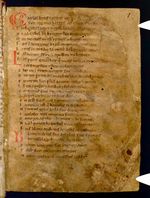
|
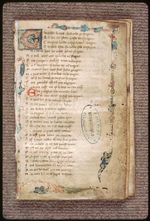
|
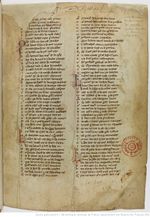
|
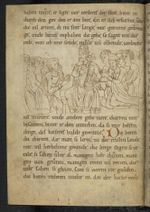
|
| Manuscrit d'Oxford | Manuscrit de Châteauroux | Manuscrit de Paris | Manuscrit de Konrad |
|---|
The most famous of the manuscripts (the Oxford one) contains several hundred couplets (laisses in French). For each laisse, a page makes it possible to compare different versions. See for example:
- Another example of reissue with Léon Gautier's glossary
The treatment of critical editions is also very relevant in a hypertext approach. The figure on the right shows Léon Gautier's glossary entry for the term Emperere. This glossary occupies approximately 200 pages (with an average of 20 to 30 entries per page). The wiki offers 3 navigation paths in this glossary:
- for the editors, the list of facsimiles (example the page containing Emperere);
- for linguists, linear access to a republished glossary (resolution of abbreviations and links to verses). Here, for example, is the terms beginning with EM.
- for further processing, the glossary entry can be made into a wiki article (example, looking for evidence on how to pronounce Emperere beyond the Oxford manuscript).
- Research articles and works inspired by the Chanson de Roland
In addition to reference works, it is worth mentioning here other sources of information:
- research articles. On Google Scholar, the query "chanson de roland" gives 30,000 results (and 200,000 for Charlemagne).
- the multiple articles, poems, images that were inspired by this epic. For example:
- In France: La mariage de Roland par Victor Hugo or Le Cor d'Alfred de Vigny).
- In Italy: In 1300, Dante Alighieri quotes Roland, Charlemagne and Ganelon (In Hell from the Divine Comedy, cantos xxxi and xxxii). In 1521, the complex character of Roland inspired Ariosto with his Orlando Furioso.
Musical topics
We have shown the interest and scope of a digital project on the Chanson de Roland.
This poem naturally inspired musicians.
On this wiki, we have for example excerpts from the opera Roland à Roncevaux d'Auguste Mermet. This piece sings of Roland's bravery but has little to do with Théroulde's poem.
Likewise, the poem Orlando furioso was the basis of some operas by Vivaldi, Lulli, Luigi Rossi or Georg Friedrich Handel. But their framework is very far from that of the Chanson de Geste.
Contributions of Gilles Mathieu's oratorio for the digital site
The musical works inspired by the Chanson de Roland are therefore often quite far from the original text.
For his part, Gilles Mathieu composed his libretto from a selection of fifty verses from which he extracted essential verses for their dramatic intensity. He thus joined the jugglers who declaimed while singing the verses of the song.
Gilles Mathieu's work therefore becomes a remarkable entry point for rediscovering the Chanson de Roland.
On an operational level concerning digitization, this work plays a very interesting role. Indeed, the previous paragraph shows the extent of the work which amounts to ten years of development. On the other hand, the treatment of the verses chosen by Gilles Mathieu makes it possible to focus on an intermediate result in 2 years (i.e. one year from the day of writing this article).
Contributions of the digital site for a musical project on the music of Gilles Mathieu
The oratorio was performed by the Chorale Universitaire de Nancy in 2009. It can be listened to in its entirety, movement by movement, on this wiki (here for example).
Likewise, all the scores (in PDF) are accessible in the same way.
For the past few weeks, for the ensemble of voices (SATB), the working documents (which have become traditional on choir sites) have been available.
This set can already be used by any musical formation that would like to interpret the whole (or part of the oratorio).
For the future, two medium-term objectives (one year) are sought:
- Transcribe all the musical elements in LyliPond.
- Thus, a choir director to make modifications by producing new scores (to see a partial example on the second movement) .
- It will be possible to build learning (or analysis) elements with several instruments.
- For each musical phrase:
- To work on aspects related to pronunciation, provide links to the entire glossary (an example with bars 38 at 45 of the second movement).
- To improve comprehension, full treatment of the corresponding verse (laisse) (an example with laisse 15 corresponding to the preceding sentence).
In the longer term, two objectives are targeted:
- offer the public of a concert consequent works with an adapted navigation.
- for specialists (or the curious) to deal with manuscripts (or reference works) in their entirety.
Thus a musical project launched today can:
- for choristers, benefit from an adaptable work base at the start of rehearsals,
- for the public, distribute a quality site at the time of the concerts.
Finally, experiments are underway in a multilingual strategy:
- The multilingual banner at the top of this page is the result of a first test.
- The integration of English translation by Charles Kenneth Scott Moncrieff is under study.
A European Conclusion
Charlemagne is an emperor who ruled much of Europe. In the Middle Ages, the Chanson de Roland was copied, translated into multiple languages (German, Italian, Noroit), or... contradicted in Spain.
In this Europe, four countries (Germany, Belgium, France, Luxembourg) have active frameworks for cross-border cooperation (Greater Region, Upper Rhine, Champagne-Ardenne Wallonia).
At the heart of this cross-border space, thanks to the A Cœur Joie movement, the idea of setting up a musical project was raised, particularly on the island of Kos between Lorraine and Wallonia. In Lorraine, within the framework of a symposium on the amateur musician, this reflection was taken up.
A musical project, around Gilles Mathieu's oratorio carried and sung by a group of border regions mentioned here, is therefore a relevant objective, probably capable of obtaining European funding. Among the potential frameworks, let us mention the Choralies of Vaison-la-Romaine in 2025. In other words, it would take a year to two to study the project and about a year of musical work.
Three years is also the time needed to offer the public a significant digital library from the current site.
At work !
See also
- Notes
- ↑ We are working on a multilingual version that will offer such a ressource for English readers.

